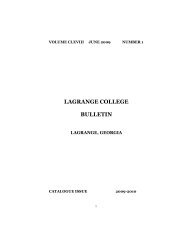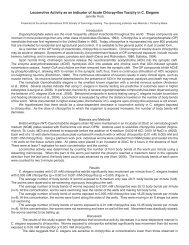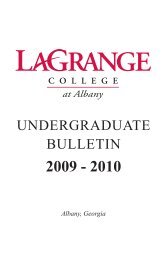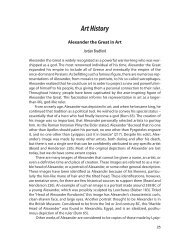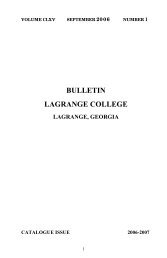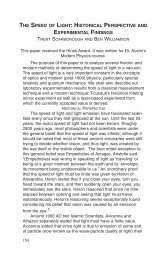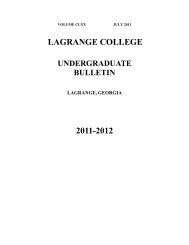Works of Mercy as a Vital Component to Sanctification - LaGrange ...
Works of Mercy as a Vital Component to Sanctification - LaGrange ...
Works of Mercy as a Vital Component to Sanctification - LaGrange ...
Create successful ePaper yourself
Turn your PDF publications into a flip-book with our unique Google optimized e-Paper software.
<strong>Works</strong> <strong>of</strong> <strong>Mercy</strong> <strong>as</strong> a <strong>Vital</strong> <strong>Component</strong> <strong>to</strong> <strong>Sanctification</strong><br />
and bring all the money they could spare once a week ‘<strong>to</strong>ward a<br />
common s<strong>to</strong>ck.’ ” 54 Furthermore, in Wesley’s 1783 sermon,<br />
“The General Spread <strong>of</strong> the Gospel,” Wesley says that communally<br />
sharing goods is an escha<strong>to</strong>logical goal <strong>to</strong> be realized<br />
when Pentecost fully comes. Wesley says, “”None <strong>of</strong> them [the<br />
Church] will say, that aught <strong>of</strong> the things which he possesses is<br />
his own; but they will have all things common. Neither will there<br />
be any among them that want: For <strong>as</strong> many <strong>as</strong> are possessed<br />
<strong>of</strong> lands or houses will sell them; and distribution will be made <strong>to</strong><br />
every man, according <strong>as</strong> he h<strong>as</strong> need.” All their desires, meantime,<br />
and p<strong>as</strong>sions, and tempers will be c<strong>as</strong>t in one mould.” 55<br />
This Anglican commitment <strong>to</strong> the apos<strong>to</strong>lic church w<strong>as</strong> an ideal<br />
that Wesley held dearly and w<strong>as</strong> one he strove <strong>to</strong> revive through<br />
the Methodism revival movement. 56 Wesley w<strong>as</strong> promoting cultural<br />
change <strong>as</strong> well <strong>as</strong> works <strong>of</strong> mercy by trying <strong>to</strong> recover the<br />
imitation <strong>of</strong> Christ embodied by the early church.<br />
In sum, it is evident that for Wesley the imitation <strong>of</strong><br />
Christ imparts motivation <strong>to</strong> undertake works <strong>of</strong> mercy.<br />
Moreover, the imitation <strong>of</strong> Christ is an element that connects<br />
sanctification <strong>to</strong> works <strong>of</strong> mercy. Because God is revealed in<br />
Jesus, it follows that one can become sanctified (res<strong>to</strong>red <strong>to</strong> the<br />
image <strong>of</strong> God) through the imitation <strong>of</strong> Christ. Although this is<br />
true, there is more <strong>to</strong> the picture; an important element is missing.<br />
By understanding the imitation <strong>of</strong> Christ <strong>as</strong> the only incentive<br />
for works <strong>of</strong> mercy, one is likely <strong>to</strong> misunderstand works <strong>of</strong><br />
mercy <strong>as</strong> only a duty and not a response <strong>to</strong> God’s love and<br />
grace. If works <strong>of</strong> mercy are not grounded in an initial experience<br />
<strong>of</strong> God’s love, one is in danger <strong>of</strong> works-righteousness and<br />
human efforts <strong>to</strong> become holy. The missing element allows for a<br />
simpler illustration <strong>of</strong> God’s prevenience and the human<br />
response—one response being works <strong>of</strong> mercy. Moreover, if the<br />
imitation <strong>of</strong> Christ is the only rationale for works <strong>of</strong> mercy, one is<br />
in danger <strong>of</strong> limiting the means <strong>to</strong> holiness <strong>to</strong> one area.<br />
Expanding the Means <strong>to</strong> Holiness<br />
The missing element that completes the connection<br />
between works <strong>of</strong> mercy and sanctification lies in grace. Wesley<br />
views sanctification <strong>as</strong> a process governed by grace, because it<br />
is through God’s grace that one begins <strong>to</strong> defeat the presence <strong>of</strong><br />
sin and become perfect in love. As Randy Maddox states,<br />
“When one understands sanctification on Wesley’s terms, <strong>as</strong> a<br />
life-long process <strong>of</strong> healing our sin-dis<strong>to</strong>rted affections, there is<br />
170



